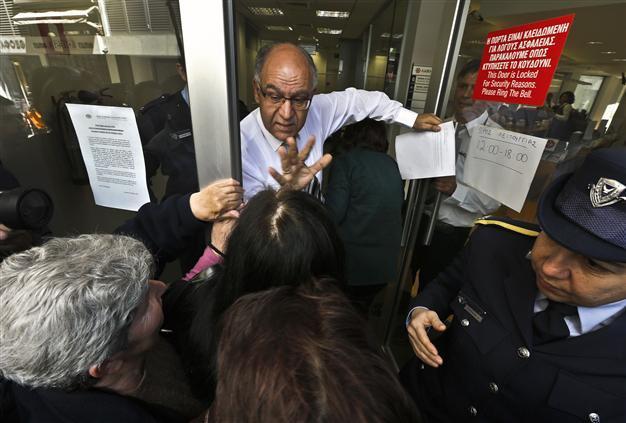Greek Cyprus banks reopen with limits on transactions
NICOSIA - The Associated Press

A Laiki Bank manager tries to calm depositors waiting for the opening of the bank's branch in Nicosia March 28, 2013. REUTERS photo
Banks in Greek Cyprus reopened to customers for the first time in nearly two weeks March 28, under tight controls imposed on transactions to prevent a run on deposits after the government was forced to accept a stringent EU rescue package to avert bankruptcy.Large lines had formed outside the banks ahead of the opening of banks for six hours from noon. Systems were frozen ahead of the start of business, and guards from a private security firm reinforced police outside some ATMs and banks in the capital, Nicosia.
Branches of the country’s troubled second-largest lender, Laiki, didn’t open on time due to a delay in the bank’s computer system. Banks in Greek Cyprus have been shut since March 16 to prevent people draining their accounts as politicians scrambled to come up with a plan to raise enough funds for Greek Cyprus to qualify for 10 billion euros ($12.9 billion) in bailout loans for its stricken banking sector. An initial plan that would have seized up to 10 percent of people’s bank deposits was soundly rejected in Parliament, leaving politicians struggling to come up with an alternative.
The deal was reached in Brussels on March 25, and imposes severe losses on deposits of over 100,000 euros in the country’s two largest banks, Laiki and Bank of Cyprus. Laiki will be broken up, with its good assets being absorbed by Bank of Cyprus.
Restrictions on transactions
Although the banks have opened, customers are severely limited in what transactions they can carry out. Capital controls, imposed to prevent worried savers and businesses rushing to withdraw all their money, include limiting cash withdrawals to 300 euros ($383) per day per person and limiting payments abroad to 5,000 euros.
No checks can be cashed, although they can be paid in, and people leaving the country can only take up to 1,000 euros, or the equivalent in foreign currency, with them in cash.
Time deposits, where money is put in an account for an agreed period, cannot be withdrawn early unless the money will be used to pay off a loan to the same bank. Banks cannot make non-cash payments or money transfers that circumvent the capital controls. Capital controls are in place for all accounts, payments and money transfers in any currency. The capital controls do not apply to any new money deposited from abroad after March 27, cash withdrawals via debit or credit card from an account in another country and Diplomatic missions.
The restrictions will be reviewed daily and are initially in place until April 3, the decision published by the Finance Ministry states.
















